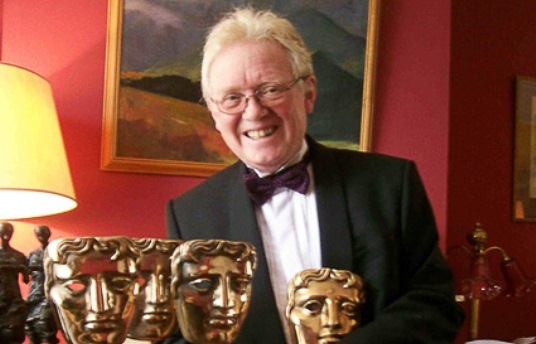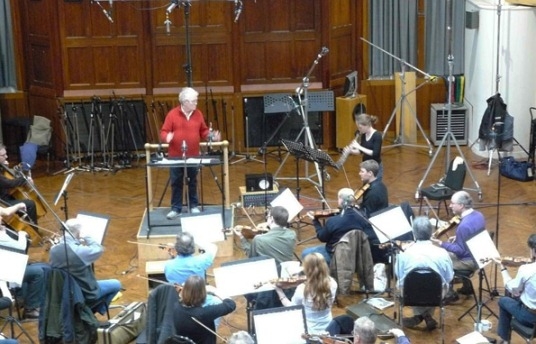People in Film: Christopher Gunning
May 01, 2011

Christopher Gunning was born in 1944 and grew up in Hendon, a suburb of London, just after the Second World War. Composing was always second nature, and Christopher would invent pieces at the piano long before he could read music. As a student he spent four years at the London Guildhall School of Music and Drama, and there he studied composition, piano and percussion. Christopher has spent the greater part of his career writing television and film scores, which vary in character from period pieces to contemporary drama. He has won four BAFTA awards for ‘La Vie en Rose,’ Agatha Christie’s ‘Poirot’, ‘Middlemarch’ and ‘Porterhouse Bluse’. His next film score will be for the upcoming drama ‘Virtuoso’, about a brilliant pianist whose devotion to musical perfection has taken over his life.
DFI: How did you first get into the industry?
Christopher: Well, in fits and starts. I was pretty intent on being a film composer quite early on, and one of my teachers was Richard Rodney Bennett who was, at that time, writing some very big movie scores. Richard recommended me to some documentary filmmakers who were looking for a composer and they agreed to his suggestion, even though I was totally inexperienced at the time, but that’s how I got my first film. By and large that’s how it used to work in those days. People would maybe start writing docs and then progress on to bigger and better things, and when they’d done that it wasn’t uncommon for them to recommend people younger than them to carry on. I don’t think it works like that anymore.
DFI: How has it changed? What would the route for a young composer be?
Christopher: I don’t know. I think it’s quite scary and I think it’s very competitive indeed. In those days there weren’t such things as film schools. Nowadays there are several universities and several colleges that run courses on film composing, and therefore they produce a lot of graduates all looking for work. In fact it could well be argued that they’re producing too many for the amount of work available although, it has also to be said, there is more work available now than ever there was when I was getting started.
DFI: At what point would you normally join a production?
Christopher: Well it varies enormously. It really all depends on when one is invited to get on board. In general I prefer it to be right at the very beginning because then you can follow the production as it develops and indeed follow the film as it develops, and therefore when you start writing the music it’s not such a terrifying prospect. There again I would say a good 60-75 percent of the time I’ve been asked when the film is almost finished. They’ve reached something near a fine cut and there are only two things remaining to be done: the music has to be composed and the effects editors have to lay all the effects.
DFI: In ‘La Vie En Rose’, how did you work with the songs of Edith Piaf, which you knew would be incorporated into the film?
Christopher: It’s an interesting case because the director decided right from the very beginning that there was going to be a proper score, quite in addition and quite separate from the songs, but of course I had to take into account what the songs were like. I also had to work on the songs themselves because an awful lot of them only existed as early recordings in mono (one audio track), and we were making a Dolby Stereo (multiple audio tracks) film, so something had to be done technically if we were going to use Edith Piaf’s own voice. We rapidly came to the conclusion that there were only certain circumstances when we could use her recordings, so what we had to do is rerecord the backing tracks and situate them on the right and left of the stereo, and have the original recording in the middle, and that way we were able to create a really good realistic sounding Dolby stereo.
Beautiful piece by Christopher Gunning from the movie ‘La Vie En Rose' (La Môme),
مقطوعة جميلة من تأليف كريستوفر غانينغ من فيلم لا موم
DFI: How do you keep coming up with new ideas for scores?
Christopher: I don’t know, people ask me that and I’m never quite sure how to reply. All I can say is composing is my job and it very much depends on coming up with ideas. I don’t think one can always pretend that one’s ideas are completely revolutionary and the most original things in the world, but at the same time you do hope you’re going to come up with something fresh and suitable for each project. Providing you can come up with some sort of an idea you can fall back on the technique that you’ve developed and learnt to help you along with it. Occasionally one goes into complete panic and thinks: “I haven’t got a single idea in my head, I don’t know what to do!” You just hope that isn’t going to happen too often!

Christopher Gunning Conducting in a Recording Studio.
DFI: How has digital technology changed your work flow? Is it a good or bad thing for the profession?
Christopher: I think it’s mixed. It’s completely changed my work methods. Once upon a time I would just sit at the piano or sit at a desk and write the music, and now I sit at the computer and do it. Of course there is a vast difference there. The computer makes certain things very, very easy: one might argue too easy. That’s why in a lot of scores that I probably won’t like very much there is a hell of a lot of repetition, and that’s simply because they’ve been copying and pasting. In other ways it’s helped enormously from the point of view of scoring. What I can do is create a beautiful score, and I use a program called Sibelius to do that, and then I just click on each individual instrument and it will come out with its own part. All I have to do is print that off, so that has speeded up the process no end. In days gone by we used to have an army of copyists copying out the parts from our scores.
There are other changes too. The whole business of synchronising music to pictures is something that anyone can do provided they’ve got the right programmes on their home computer. That’s an astonishingly big development. Then there’s the whole area of electronic music itself where there are no live musicians and you don’t have a score. I would say as a rough estimate that maybe 75-80 percent of the scores on the TV are done electronically, and are composed in the same way as young people do in their bedrooms.
DFI: How does a score bring out the story of a film?
Christopher: There are several ways you can do it. You can identify certain characters with certain themes: that’s a method I’ve used quite a lot. For instance, in my music for ‘Poirot’ (the British TV series), if you listen to it carefully you will hear that more or less every time Poirot is on the screen there is some reference to his own theme, and when other people are more important then there’s somebody else’s theme and so forth. Then you can do all sorts of interesting things such as combining the two together. I think above all it’s just getting the emotional temperature right, I think that’s the crucial thing in film composition. A great many decisions have to be made by the director and the composer at the same time. For instance where the music is going to go, what sort of mood is going to be the thing, and it’s worth talking it through with the director, so you know why you’re writing music for each particular section, even if only so there aren’t any major shocks later on at a recording session when there is something extremely bombastic when the director wanted something rather gentle. It can happen!
Christopher Gunning - Hercule Poirot (The Belgian Detective)
كريستوفر غانينغ - هركول بوارو (التحري البلجيكي)
DFI: What are the most important qualities for a young aspiring film composer?
Christopher: Obviously being a great and versatile musician, that goes without saying. I think that temperamentally you just have to be quite strong and not subject to panic attacks, and not subject to flying off the handle when someone criticizes your music. So I think a nice sort of calm, friendly temperament would help.